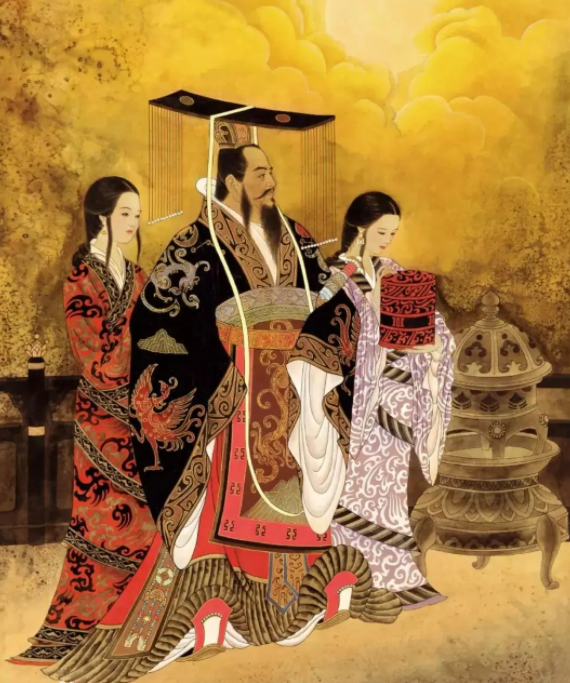Han Wu Di-Liu Che
Liu Che, Emperor Wu of the Han Dynasty (July 14, 157-march 29, 87 BC [1]), was the seventh emperor of the Han Dynasty and the emperor, politician, strategist, poet, national hero and writer of the Western Han Dynasty. Han nationality. Emperor Wu of the Han Dynasty is the tenth son of Liu Qi, Emperor Jing of the Han Dynasty, the grandson of Liu Heng, Emperor Wen of the Han Dynasty, the great grandson of Liu Bang, Emperor Gaozu of the Han Dynasty, and the great grandson of Liu Taigong, the supreme emperor. His mother is the queen Wang. He was born in Chang'an in 157 B.C. and collapsed in wuzha palace in 87 B.C. at the age of 70. Emperor Wu of the Han Dynasty was made king of Jiaodong at the age of 4 and crown prince at the age of 7. He ascended the throne at the age of 16 and reigned for 54 years (141-87 BC), establishing the most brilliant achievements of the Western Han Dynasty. Years used: Jianyuan, Yuanguang, Yuanshuo, Yuanshou, Yuanding, Yuanfeng, Taichu, Tianhan, Taishi, Zhenghe and Houyuan. Posthumous title "Xiaowu", later buried in Maoling.

The posthumous title law says that "power, strength, virtue and martial arts" means that dignity, strength, wisdom and benevolence are called martial arts. His great talent, literary and martial arts made the Han Dynasty the most powerful country in the world at that time, and he became the great emperor in Chinese history.
Emperor Wu of Han Dynasty created six "firsts"; First: the first emperor to unify his thoughts with Confucianism. Second: the first emperor who founded Imperial College to train talents. Third: the first emperor to vigorously expand China's territory. Fourth: the first emperor to open the western regions. Fifth: the first emperor to use the emperor's year to the era. Sixth: the first emperor who made self-criticism in the form of criminal edict.
He built a country with unprecedented dignity; He gave an ethnic group the confidence to stand up for thousands of years; His country name has become the eternal name of a great nation.
The founding year of Emperor Wu of Han Dynasty is also the first emperor in China to use the year number. At the beginning of his accession to the throne, he continued the policy of health preservation and interest for the people pursued by his father, further weakened the power of the princes, issued the order of mercy proposed by the Minister Lord Fuyan, and promoted the princes to enfew their sons as princes by the legal system, so that the fiefs of the princes had to be reduced by themselves. At the same time, he set up an assassin to supervise the local government. In the military and economy, we will strengthen the centralization of power, organize private businesses such as iron smelting, salt boiling and wine making into central management, and prohibit vassal states from casting money, so that the financial power is centralized in the central government. He adopted Dong Zhongshu's proposal to "depose a hundred schools of thought and respect Confucianism alone", paving the way for Confucianism to become feudal orthodoxy. However, in fact, Emperor Wu of the Han Dynasty never lacked the thought of rule of law. While promoting Confucianism, Emperor Wu of the Han Dynasty also adopted laws and regulations and criminal law to consolidate the authority of the government and show the status of imperial power. Therefore, sinologists believe that this should be a system dominated by law, supplemented by Confucianism, internal law and external Confucianism, which publicized Confucianism and Taoism to the general public to show the tenderness of the government, and imposed harsh criminal law on the government to restrain the ministers. However, xuanru did not mean abandoning the law. The law was still the final ruling means in the period of Emperor Wu of the Han Dynasty. Ji'an and Zhu Fuyan, which were actively used at that time, were famous examples.
The spring festival began at the beginning of the lunar calendar, and Emperor Wu of the Han Dynasty changed the new moon. During the period of Emperor Wu of the Han Dynasty, Wei Qing and Huo Qubing made three large-scale attacks on the Xiongnu, "there is no royal court in the south of the desert". Zhang Qian was sent to the western regions to open up the silk road. Since then, the western regions have become the intersection of several major civilizations, and Emperor Wu of the Han Dynasty is known as "crowned by hundreds of kings".
Through our personalized Chinese lessons, you will have the opportunity to delve deeper into the realms of Chinese history and culture.